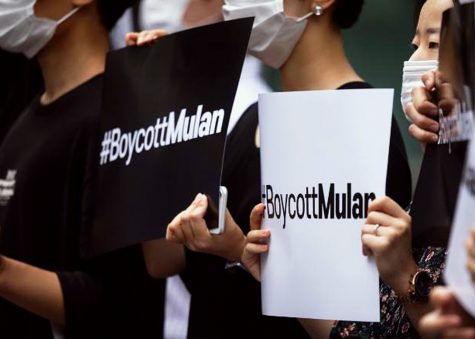Mulan Fails to Gain Honor Among Viewers
Though fans of Disney have long been waiting for the live-action version of Mulan, recent reviews have been mixed.
Originally planned to be released on March 27, 2020, the movie was rescheduled numerous times before premiering on Disney+ for 29.99 dollars on September 4, 2020 (there is an additional 6.99 dollars monthly fee to be subscribed to Disney+). The 29.99 dollar fee will be cut on December 4, 2020.
The original 1998 animated Mulan film is based on an ancient Chinese legend and follows the story of Fa Mulan, who disguises herself as a man and joins the military in place of her father to defeat the invading Huns. The film was released to critical and commercial success and its humor, message and iconic soundtrack have made it a Disney classic. Shortly after the original’s release, Disney began to explore the idea of a live-action remake. After many different plans and iterations, the idea finally came to fruition in 2015 when the remake entered development.
Unlike some previous live-action remakes, including Beauty and the Beast (2017) and Cinderella (2015), Mulan does not follow the animated version’s storyline. Gone are the famous Disney songs, including “I’ll Make a Man Out of You” and “Honor to Us All,” and characters such as Commander Li Shang and Mushu, Mulan’s dragon sidekick. Instead, this movie focuses on action and magic, interwoven with female empowerment and references to the original movie.
Alicia Yu (I), who has watched both the animated Mulan and the live-action version, says she “100 percent preferred the animated version,” because the original version “has the music, […] good comedic relief [and] the story arc is a lot better.” Yu continues, “The live-action one is just eye candy. The only good remarkable thing about the live action one is that there’s really good [fight] scenes […] and cinematic landscape scenes.”
The greatest critiques of the movie, however, are related to comments of two lead actors in the film. Liu Yifei and Donnie Yen, who play Mulan and Commander Tung respectively, have both given anti pro-democracy statements regarding Hong Kong. In August 2019, Liu, a Chinese American citizen, shared a post on Weibo from the government-run newspaper, People’s Daily, that read (in Chinese): “I also support Hong Kong police. You can beat me up now.” The post adds in English: “What a shame for Hong Kong.” Hong Kong police, loyal to China, have used excessive force against citizens of Hong Kong, mostly youth, who are protesting for democracy and a high degree of autonomy from China.
On July 1, 2020, Yen posted on Facebook stating, “Today is the celebration day for Hong Kong returned to motherland China 23 years,” referring to the day that the previously British-owned region became a Special Administrative Region under the jurisdiction of China. Yen’s comment is criticized for celebrating a handover that resulted in Hong Kong losing much of its autonomy and many of the citizens’ rights.

These posts, in addition to other controversies surrounding the film, such as scenes being shot in the Uyghur-Majority Xinjiang region and the lack of Asian representation in the production team, have sparked a significant backlash against the film. The Xinjiang region of China has recently appeared in headlines around the global due to its “reeducation centers” established by the government for ethnic Uyghurs to be involuntarily indoctrinated with the culture of the Han Chinese in a prison-like setting.
Pro-democracy activists, specifically in Hong Kong and Thailand, have pushed to boycott the Mulan movie altogether, and the hashtag #BoycottMulan has been trending online as a result.
Disney has not released any statements in response to comments by Liu and Yen. With ever-increasing profits on the line in the Chinese film industry, it is no surprise that Disney has prioritized box office profits over confronting China with a pro-democracy stance.
Mulan has made 64.4 million dollars so far. The cost of production was 200 million dollars. To those interested in watching Mulan, Yu adds, “I think it’s definitely a waste of your money if you try to watch it now, […] because of all the news it has, like an all-white background cast, […] the main actress’s controversies and other controversies surrounding the movie, and of course the [high] price, I don’t think it’s worth watching if you have to pay for it.”
Yu remarks that, despite being unimpressed with the movie, she likes the character development of the witch, Xian Lang (played by Gong Li), who is a new introduction to the Mulan story.
As Disney continues its silence regarding the backlash, the scrutiny and controversy surrounding the movie are sure to continue.








